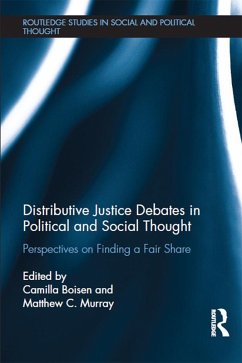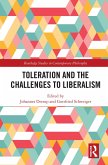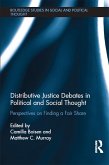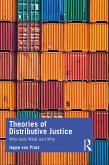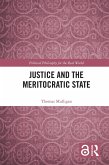Distributive Justice Debates in Political and Social Thought (eBook, ePUB)
Perspectives on Finding a Fair Share
Redaktion: Boisen, Camilla; Murray, Matthew C.
49,95 €
49,95 €
inkl. MwSt.
Sofort per Download lieferbar

25 °P sammeln
49,95 €
Als Download kaufen

49,95 €
inkl. MwSt.
Sofort per Download lieferbar

25 °P sammeln
Jetzt verschenken
Alle Infos zum eBook verschenken
49,95 €
inkl. MwSt.
Sofort per Download lieferbar
Alle Infos zum eBook verschenken

25 °P sammeln
Distributive Justice Debates in Political and Social Thought (eBook, ePUB)
Perspectives on Finding a Fair Share
Redaktion: Boisen, Camilla; Murray, Matthew C.
- Format: ePub
- Merkliste
- Auf die Merkliste
- Bewerten Bewerten
- Teilen
- Produkt teilen
- Produkterinnerung
- Produkterinnerung

Bitte loggen Sie sich zunächst in Ihr Kundenkonto ein oder registrieren Sie sich bei
bücher.de, um das eBook-Abo tolino select nutzen zu können.
Hier können Sie sich einloggen
Hier können Sie sich einloggen
Sie sind bereits eingeloggt. Klicken Sie auf 2. tolino select Abo, um fortzufahren.

Bitte loggen Sie sich zunächst in Ihr Kundenkonto ein oder registrieren Sie sich bei bücher.de, um das eBook-Abo tolino select nutzen zu können.
The volume moves away from the more dominating and traditionally cast understandings of distributive justice and explores the long shadow of practices of trusteeship, stewardship and concepts of social and individual rights, and egalitarian practices and post-colonial African political thought.
- Geräte: eReader
- mit Kopierschutz
- eBook Hilfe
- Größe: 1.65MB
Andere Kunden interessierten sich auch für
![Liberalism and Distributive Justice (eBook, ePUB) Liberalism and Distributive Justice (eBook, ePUB)]() Samuel FreemanLiberalism and Distributive Justice (eBook, ePUB)18,95 €
Samuel FreemanLiberalism and Distributive Justice (eBook, ePUB)18,95 €![Toleration and the Challenges to Liberalism (eBook, ePUB) Toleration and the Challenges to Liberalism (eBook, ePUB)]() Toleration and the Challenges to Liberalism (eBook, ePUB)41,95 €
Toleration and the Challenges to Liberalism (eBook, ePUB)41,95 €![Distributive Justice Debates in Political and Social Thought (eBook, PDF) Distributive Justice Debates in Political and Social Thought (eBook, PDF)]() Distributive Justice Debates in Political and Social Thought (eBook, PDF)49,95 €
Distributive Justice Debates in Political and Social Thought (eBook, PDF)49,95 €![Theories of Distributive Justice (eBook, ePUB) Theories of Distributive Justice (eBook, ePUB)]() Jeppe PlatzTheories of Distributive Justice (eBook, ePUB)39,95 €
Jeppe PlatzTheories of Distributive Justice (eBook, ePUB)39,95 €![Debates in Contemporary Political Philosophy (eBook, ePUB) Debates in Contemporary Political Philosophy (eBook, ePUB)]() Debates in Contemporary Political Philosophy (eBook, ePUB)41,95 €
Debates in Contemporary Political Philosophy (eBook, ePUB)41,95 €![The Routledge Companion to Social and Political Philosophy (eBook, ePUB) The Routledge Companion to Social and Political Philosophy (eBook, ePUB)]() The Routledge Companion to Social and Political Philosophy (eBook, ePUB)45,95 €
The Routledge Companion to Social and Political Philosophy (eBook, ePUB)45,95 €![Justice and the Meritocratic State (eBook, ePUB) Justice and the Meritocratic State (eBook, ePUB)]() Thomas MulliganJustice and the Meritocratic State (eBook, ePUB)0,00 €
Thomas MulliganJustice and the Meritocratic State (eBook, ePUB)0,00 €-
-
-
The volume moves away from the more dominating and traditionally cast understandings of distributive justice and explores the long shadow of practices of trusteeship, stewardship and concepts of social and individual rights, and egalitarian practices and post-colonial African political thought.
Dieser Download kann aus rechtlichen Gründen nur mit Rechnungsadresse in A, B, BG, CY, CZ, D, DK, EW, E, FIN, F, GR, HR, H, IRL, I, LT, L, LR, M, NL, PL, P, R, S, SLO, SK ausgeliefert werden.
Produktdetails
- Produktdetails
- Verlag: Taylor & Francis eBooks
- Seitenzahl: 294
- Erscheinungstermin: 23. Oktober 2015
- Englisch
- ISBN-13: 9781317570554
- Artikelnr.: 44014073
- Verlag: Taylor & Francis eBooks
- Seitenzahl: 294
- Erscheinungstermin: 23. Oktober 2015
- Englisch
- ISBN-13: 9781317570554
- Artikelnr.: 44014073
- Herstellerkennzeichnung Die Herstellerinformationen sind derzeit nicht verfügbar.
Camilla Boisen is Postdoctoral Research Fellow in Political Theory at the University of the Witwatersrand, Johannesburg. Her area of research is on colonial political thought in relation to the development of ideas of property rights, trusteeship and humanitarian intervention and their influence on contemporary problems such as post-colonial restitution. Matthew C. Murray is the Senior Project Advisor for the Growthpolicy.org project at the Mossavar-Rahmani Center for Business and Government at the Harvard Kennedy School of Government and serves as Special Lecturer of Philosophy at Providence College. Matthew is actively researching and publishing in the areas of critical theories of justice (subaltern, race, culture, gender and disability) and their effects on the ideas of and applications of distributive and social justice.
Table of Contents: Preface: The Limits of Distributive Justice: A Brief
Exploration of Restorative Justice David Boucher Introduction: Distributing
Distributive Justice Camilla Boisen and Matthew C. Murray (editors) Part I
- Historical Approaches to Distributive Justice Chapter 1: A Right to
Welfare: Historical and Philosophical Reflections Samuel Fleischacker
Chapter 2 - Luck Egalitarianism and the History of Political Thought Carl
Knight Chapter 3 - Radical Distributive Justice: Fichte's The Closed
Commercial State David James Chapter 4 - Social Darwinism and Social
Justice: Herbert Spencer and the Poor Matt Zwolinski Part II - Distributive
Justice Reconsidered: Forging New Debates Chapter 5: Dignity, Sociability
and Capability: Exploring Nussbaum's Interpretation of Grotius Camilla
Boisen and Matthew C. Murray Chapter 6: Care Ethics and Distributive
Justice Daniel Engster Chapter 7: Justice and Real Politics: Freedom, Needs
and Representation Lawrence Hamilton Chapter 8: Conservative Responses to
Piketty's "Unthinkable" Top Rate Income Tax Christopher Allsobrook Part III
- New Horizons Beyond the West: African and Global Issues in Distributive
Justice Chapter 9: An African Theory of Social Justice: Relationship as the
Ground of Rights, Resources and Recognition Thaddeus Metz Chapter 10 -
Social Protection & Justice: Poverty, Redistribution, and Dignity Marianne
S. Ulriksen, Sophie Plagerson, and Tessa Hochfeld Chapter 11: Territory,
Desert, and Global Distributive Justice Kim Angell Chapter 12: The Global
Commons and International Distributive Justice Peri Roberts and Peter Sutch
Conclusion: Finding a Fair Share Camilla Boisen and Matthew C. Murray
(editors)
Exploration of Restorative Justice David Boucher Introduction: Distributing
Distributive Justice Camilla Boisen and Matthew C. Murray (editors) Part I
- Historical Approaches to Distributive Justice Chapter 1: A Right to
Welfare: Historical and Philosophical Reflections Samuel Fleischacker
Chapter 2 - Luck Egalitarianism and the History of Political Thought Carl
Knight Chapter 3 - Radical Distributive Justice: Fichte's The Closed
Commercial State David James Chapter 4 - Social Darwinism and Social
Justice: Herbert Spencer and the Poor Matt Zwolinski Part II - Distributive
Justice Reconsidered: Forging New Debates Chapter 5: Dignity, Sociability
and Capability: Exploring Nussbaum's Interpretation of Grotius Camilla
Boisen and Matthew C. Murray Chapter 6: Care Ethics and Distributive
Justice Daniel Engster Chapter 7: Justice and Real Politics: Freedom, Needs
and Representation Lawrence Hamilton Chapter 8: Conservative Responses to
Piketty's "Unthinkable" Top Rate Income Tax Christopher Allsobrook Part III
- New Horizons Beyond the West: African and Global Issues in Distributive
Justice Chapter 9: An African Theory of Social Justice: Relationship as the
Ground of Rights, Resources and Recognition Thaddeus Metz Chapter 10 -
Social Protection & Justice: Poverty, Redistribution, and Dignity Marianne
S. Ulriksen, Sophie Plagerson, and Tessa Hochfeld Chapter 11: Territory,
Desert, and Global Distributive Justice Kim Angell Chapter 12: The Global
Commons and International Distributive Justice Peri Roberts and Peter Sutch
Conclusion: Finding a Fair Share Camilla Boisen and Matthew C. Murray
(editors)
Table of Contents: Preface: The Limits of Distributive Justice: A Brief
Exploration of Restorative Justice David Boucher Introduction: Distributing
Distributive Justice Camilla Boisen and Matthew C. Murray (editors) Part I
- Historical Approaches to Distributive Justice Chapter 1: A Right to
Welfare: Historical and Philosophical Reflections Samuel Fleischacker
Chapter 2 - Luck Egalitarianism and the History of Political Thought Carl
Knight Chapter 3 - Radical Distributive Justice: Fichte's The Closed
Commercial State David James Chapter 4 - Social Darwinism and Social
Justice: Herbert Spencer and the Poor Matt Zwolinski Part II - Distributive
Justice Reconsidered: Forging New Debates Chapter 5: Dignity, Sociability
and Capability: Exploring Nussbaum's Interpretation of Grotius Camilla
Boisen and Matthew C. Murray Chapter 6: Care Ethics and Distributive
Justice Daniel Engster Chapter 7: Justice and Real Politics: Freedom, Needs
and Representation Lawrence Hamilton Chapter 8: Conservative Responses to
Piketty's "Unthinkable" Top Rate Income Tax Christopher Allsobrook Part III
- New Horizons Beyond the West: African and Global Issues in Distributive
Justice Chapter 9: An African Theory of Social Justice: Relationship as the
Ground of Rights, Resources and Recognition Thaddeus Metz Chapter 10 -
Social Protection & Justice: Poverty, Redistribution, and Dignity Marianne
S. Ulriksen, Sophie Plagerson, and Tessa Hochfeld Chapter 11: Territory,
Desert, and Global Distributive Justice Kim Angell Chapter 12: The Global
Commons and International Distributive Justice Peri Roberts and Peter Sutch
Conclusion: Finding a Fair Share Camilla Boisen and Matthew C. Murray
(editors)
Exploration of Restorative Justice David Boucher Introduction: Distributing
Distributive Justice Camilla Boisen and Matthew C. Murray (editors) Part I
- Historical Approaches to Distributive Justice Chapter 1: A Right to
Welfare: Historical and Philosophical Reflections Samuel Fleischacker
Chapter 2 - Luck Egalitarianism and the History of Political Thought Carl
Knight Chapter 3 - Radical Distributive Justice: Fichte's The Closed
Commercial State David James Chapter 4 - Social Darwinism and Social
Justice: Herbert Spencer and the Poor Matt Zwolinski Part II - Distributive
Justice Reconsidered: Forging New Debates Chapter 5: Dignity, Sociability
and Capability: Exploring Nussbaum's Interpretation of Grotius Camilla
Boisen and Matthew C. Murray Chapter 6: Care Ethics and Distributive
Justice Daniel Engster Chapter 7: Justice and Real Politics: Freedom, Needs
and Representation Lawrence Hamilton Chapter 8: Conservative Responses to
Piketty's "Unthinkable" Top Rate Income Tax Christopher Allsobrook Part III
- New Horizons Beyond the West: African and Global Issues in Distributive
Justice Chapter 9: An African Theory of Social Justice: Relationship as the
Ground of Rights, Resources and Recognition Thaddeus Metz Chapter 10 -
Social Protection & Justice: Poverty, Redistribution, and Dignity Marianne
S. Ulriksen, Sophie Plagerson, and Tessa Hochfeld Chapter 11: Territory,
Desert, and Global Distributive Justice Kim Angell Chapter 12: The Global
Commons and International Distributive Justice Peri Roberts and Peter Sutch
Conclusion: Finding a Fair Share Camilla Boisen and Matthew C. Murray
(editors)
